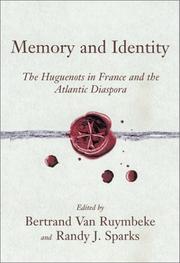
ISBN: 1570034842 9781570037955 Year: 2008 Publisher: Columbia, S.C. The University of South Carolina Press
Abstract | Keywords | Export | Availability | Bookmark
 Loading...
Loading...Choose an application
- Reference Manager
- EndNote
- RefWorks (Direct export to RefWorks)
Huguenots --- Religious refugees --- Réfugiés religieux --- History --- Congresses. --- Histoire --- Congrès --- Réfugiés religieux --- Congrès --- Christian church history --- History of France --- anno 1600-1699 --- anno 1700-1799
Book
ISBN: 2745310224 9782745310224 Year: 2004 Volume: 35 Publisher: Paris: Champion,
Abstract | Keywords | Export | Availability | Bookmark
 Loading...
Loading...Choose an application
- Reference Manager
- EndNote
- RefWorks (Direct export to RefWorks)
Bayle, Pierre --- Philosophy, French --- Huguenots --- Religious refugees --- Philosophie française --- Réfugiés religieux --- Bayle, Pierre, --- Philosophie française --- Réfugiés religieux --- BAYLE (PIERRE), 1647-1706 --- SAVOIR ET ERUDITION --- CRITIQUE ET INTERPRETATION
Book
ISBN: 2745305379 Year: 2002 Volume: 22. Publisher: Paris Honoré Champion
Abstract | Keywords | Export | Availability | Bookmark
 Loading...
Loading...Choose an application
- Reference Manager
- EndNote
- RefWorks (Direct export to RefWorks)
Huguenots --- Religious refugees --- Réfugiés religieux --- History --- Histoire --- France --- Germany --- Allemagne --- Church history --- Histoire religieuse --- Réfugiés religieux --- PROTESTANTISME --- PROTESTANTS --- FRANCE --- 17E SIECLE --- EUROPE --- 17E-18E SIECLES --- 18E SIECLE
Book
ISBN: 9781848934573 9781781440797 1848934572 9781138546035 9781315654218 9781317318385 9781317318392 1781440794 1781444269 1138546038 9781781444269 Year: 2018 Volume: 18 Publisher: London: Routledge,
Abstract | Keywords | Export | Availability | Bookmark
 Loading...
Loading...Choose an application
- Reference Manager
- EndNote
- RefWorks (Direct export to RefWorks)
History of Europe --- Christian church history --- anno 1500-1799 --- Réfugiés religieux --- Histoire --- Religious refugees --- Religious refugees. --- Exil. --- Religiöse Identität. --- Glaubensflüchtling. --- History --- 1500-1599. --- Europe. --- Europa. --- Histoire. --- Réfugié --- --Réfugié --- --Religion --- --Europe --- --XVIe-XVIIIe s., --- Colloque --- --2012, --- Toronto --- --actes --- --History --- Religious refugees - Europe - History - 16th century - Congresses --- Religion --- XVIe-XVIIIe s., 1501-1800 --- Europe
Book
ISBN: 0198219334 Year: 1985 Publisher: Oxford : Clarendon press,
Abstract | Keywords | Export | Availability | Bookmark
 Loading...
Loading...Choose an application
- Reference Manager
- EndNote
- RefWorks (Direct export to RefWorks)
Although the character, course, and consequences of Calvinism have long been the subject of controversy, there is no doubt that the Calvinist movement left an enduring stamp on Europe, North America, and the rest of western civilization. This book brings together the work of fourteen eminent historians who reexamine the ways in which Calvinism affected--and was affected by--the various societies in which it took root. The volume features a survey of Calvin's life and work, three essays on France and the great diaspora of the Huguenots after the Revocation of the Edict of Nantes in 1685, and seven papers on other European nations and North America. A concluding essay offers a stimulating discussion of the relationship between Calvinism and capitalism.
Christian church history --- anno 1500-1799 --- 284.2 --- Calvinism --- -Reformed Protestantism --- Congregationalism --- Reformation --- Reformed Church --- Theology, Doctrinal --- Arminianism --- Puritans --- Zwinglianism --- Calvinistische hervorming. Zwinglianisme. Hervormden --- History --- Doctrines --- History. --- -Calvinistische hervorming. Zwinglianisme. Hervormden --- 284.2 Calvinistische hervorming. Zwinglianisme. Hervormden --- -284.2 Calvinistische hervorming. Zwinglianisme. Hervormden --- Reformed Protestantism --- Calvinisme. Histoire. 16e-18e s. --- Calvinisme. Geschiedenis. 16e-18e eeuw. --- Christelijke kerkgeschiedenis --- EUROPE --- PROTESTANTS --- REFUGIES RELIGIEUX --- HISTOIRE RELIGIEUSE
Book
ISBN: 2745304259 9782745304254 Year: 2001 Volume: 17. Publisher: Paris: Champion,
Abstract | Keywords | Export | Availability | Bookmark
 Loading...
Loading...Choose an application
- Reference Manager
- EndNote
- RefWorks (Direct export to RefWorks)
Huguenots --- Religious refugees --- Réfugiés religieux --- History --- Congresses. --- Congresses --- Histoire --- Congrès --- France --- Emigration and immigration --- Church history --- Emigration et immigration --- Histoire religieuse --- Réfugiés religieux --- Congrès --- Protestants --- 16th century --- 17th century --- 18th century --- Huguenots - France - History - Congresses. --- PROTESTANTS --- HUGUENOTS --- EUROPE --- HISTOIRE --- 16E-20E SIECLES --- FRANCE --- CONDITIONS SOCIALES --- 17E-18E SIECLES

ISBN: 0754632393 Year: 2004 Publisher: Aldershot, Hants, England ; Burlington, VT : Ashgate,
Abstract | Keywords | Export | Availability | Bookmark
 Loading...
Loading...Choose an application
- Reference Manager
- EndNote
- RefWorks (Direct export to RefWorks)
Religious refugees --- Evangelicalism --- Réfugiés religieux --- Evangélisme --- History --- Histoire --- Foxe, John, --- England --- Angleterre --- Church history --- Histoire religieuse --- 283*1 --- 929 FOXE, JOHN --- Anglicanisme:--16de eeuw --- Biografie. Genealogie. Heraldiek--FOXE, JOHN --- 929 FOXE, JOHN Biografie. Genealogie. Heraldiek--FOXE, JOHN --- 283*1 Anglicanisme:--16de eeuw --- Réfugiés religieux --- Evangélisme --- Fox, John, --- Fox, --- Fox, Iohn, --- Bale, John, --- Norfolk, Thomas Howard, --- Influence
Book
ISBN: 9782600006873 2600006877 Year: 2009 Volume: 464 Publisher: Genève: Droz,
Abstract | Keywords | Export | Availability | Bookmark
 Loading...
Loading...Choose an application
- Reference Manager
- EndNote
- RefWorks (Direct export to RefWorks)
Dans les huit essais rassemblés ici, Heiko Oberman évalue un demi-siècle de recherche sur le Calvinisme. Il explore les prémices de la pensée de Calvin – lorsque celui-ci appelle les églises persécutées de France et les communautés d’exilés partout en Europe – et par ce retour aux sources de la Réforme, Heiko Oberman cherche à identifier en quoi le Calvinisme a été le mouvement le plus rallié du Christianisme Protestant vers la fin du seizième siècle. Incisif dans ses arguments et perspicace dans son point de vue, les découvertes d’Oberman ont grandement contribué à la forme actuelle de la recherche sur Calvin et sur le Calvinisme.
Reformation. --- Calvinism --- Reformation --- Protestant Reformation --- Church history --- Counter-Reformation --- Protestantism --- Reformed Protestantism --- Congregationalism --- Reformed Church --- Theology, Doctrinal --- Arminianism --- Puritans --- Zwinglianism --- History --- Doctrines --- Calvin, Jean, --- Calvijn, Johannes --- Calvin, Jean --- Calvinus, Johannes --- Calvin, John --- Calvinism - Europe - History - 16th century --- Calvin, Jean, - 1509-1564 --- Calvin, Jean (1509-1564) --- Réforme --- Réfugiés religieux --- Huguenots --- Critique et interprétation --- Influence
Multi
ISBN: 9781107024564 9781139170055 9781107652415 1107652413 1107024560 1316354903 1316348903 1139170058 Year: 2015 Publisher: New York, N.Y. Cambridge University Press
Abstract | Keywords | Export | Availability | Bookmark
 Loading...
Loading...Choose an application
- Reference Manager
- EndNote
- RefWorks (Direct export to RefWorks)
The religious refugee first emerged as a mass phenomenon in the late fifteenth century. Over the following two and a half centuries, millions of Jews, Muslims, and Christians were forced from their homes and into temporary or permanent exile. Their migrations across Europe and around the globe shaped the early modern world and profoundly affected literature, art, and culture. Economic and political factors drove many expulsions, but religion was the factor most commonly used to justify them. This was also the period of religious revival known as the Reformation. This book explores how reformers' ambitions to purify individuals and society fueled movements to purge ideas, objects, and people considered religiously alien or spiritually contagious. It aims to explain religious ideas and movements of the Reformation in nontechnical and comparative language.
Reformation. --- Réfugiés religieux --- Religious refugees. --- Flüchtling. --- Religiöse Verfolgung. --- 1492-1648. --- Réfugiés religieux --- Christian church history --- History of Europe --- anno 1600-1699 --- anno 1400-1499 --- anno 1500-1599 --- Religious refugees --- History. --- Europa. --- Europe --- Europe. --- History --- Réforme protestante --- Histoire --- Réforme (Christianisme) --- Réforme protestante. --- Histoire. --- Refugees, Religious --- Refugees --- Protestant Reformation --- Reformation --- Church history --- Counter-Reformation --- Protestantism --- Réforme protestante.
Book
ISBN: 9780190264741 0190264748 Year: 2020 Publisher: New York, N.Y. Oxford University Press
Abstract | Keywords | Export | Availability | Bookmark
 Loading...
Loading...Choose an application
- Reference Manager
- EndNote
- RefWorks (Direct export to RefWorks)
Huguenot refugees were everywhere in the early modern world. Exiles fleeing French persecution, they scattered around Europe and beyond following the Revocation of the Edict of Nantes in 1685, settling in North America, the Caribbean, South Africa, and even remote islands in the Atlantic and Indian Oceans. This book offers the first global history of the Huguenot diaspora, explaining how and why these refugees became such ubiquitous characters in the history of imperialism. The story starts with dreams of Eden, as beleaguered religious migrants sought suitable retreats to build perfect societies far from the political storms of Europe. In order to create these communities, however, the Huguenots needed patrons, and they thus ran headlong into the world of politics. The refugees promoted themselves as the chosen people of empire, religious heroes who also possessed key skills that would strengthen the British and Dutch states. As a result, French Protestants settled around the world - they tried to make silk in South Carolina; they planted vines in South Africa; and they peopled vulnerable frontiers from New England to Suriname. Of course, this embrace of empire led to a gradual abandonment of the Huguenots' earlier utopian ambitions. They realized that only by blending in, and by mastering foreign institutions, could they prosper in a quickly changing world. Nonetheless, they managed to maintain a key role in the early modern world well into the eighteenth century, before the coming of Revolution upended the ancien regime.
Christian church history --- History of France --- anno 1600-1699 --- anno 1700-1799 --- Huguenots --- Religious refugees --- Refugees, Religious --- Refugees --- History --- 284.5 --- 284.5 Hugenoten. Calvinisme in Frankrijk--(1550-1685) --- Hugenoten. Calvinisme in Frankrijk--(1550-1685) --- Réfugiés religieux --- History. --- Réfugiés religieux

 Search
Search Feedback
Feedback About UniCat
About UniCat  Help
Help News
News